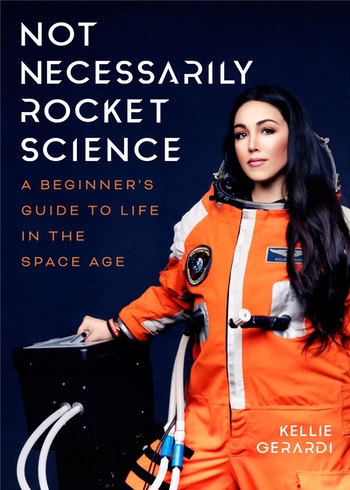Review: Not Necessarily Rocket Scienceby Jeff Foust
|
| “We were unified in the nobility of our purpose, but we had inadvertently cultivated an industry echo chamber, speaking most often to each other and others already ‘in the know,’” she writes. |
That includes someone with an education in film, as is the case of Kellie Gerardi, the author of Not Necessarily Rocket Science. She studied film at Columbia University and New York University, but in a series on internships found she was more talented behind the scenes, handling operations and media outreach, than behind the camera. After graduation, a chance encounter at an Explorers Club dinner with Richard Garriott—whom she recognized from her “middle school video game obsession”—piqued her interest in space, allowing her to use her experience in media and communications. That led to work at the Commercial Spaceflight Federation, Masten Space Systems, and other roles.
Her book is part memoir of her unconventional career in the space industry, and part guide for interested in charting their own paths into the field. (The book’s first chapters also provide a condensed history of spaceflight for those people coming in from outside the field entirely.) It is less a guide for those wanting a career like hers than one explaining how she leveraged her skills and interests to take advantage of opportunities; approaches that can be used by others for their own unique career paths. One chapter lays that out plainly in advice that’s applicable to almost anyone, from finding mentors and doing the important—but not necessarily glamorous—work to leaving your comfort zone.
Part of that message is one of diversity. That includes obvious issues like gender and racial diversity (“To paraphrase Douglas Adams, space is white,” she writes. “You won’t believe how vastly, hugely, mind-bogglingly white it is.”) It also, though, includes diversity of thought and viewpoints, particularly as the commercial space industry seeks broader public support. “We were unified in the nobility of our purpose, but we had inadvertently cultivated an industry echo chamber, speaking most often to each other and others already ‘in the know,’” she writes, recalling the backlash in some parts of the media to commercial space after the SpaceShipTwo test flight accident in 2014. If the industry wanted public support in the bad times, it needed to be more open in the good times, “and that meant expanding our voice and presence.”
Gerardi has done just that in her various roles, including appearing on the ABC talk show “The View” when she was a Mars One finalist. She readily accepts being a social media influencer, a term that has negative connotations to some. “I’ve never found the word influencer to be pejorative,” she explains. “The content I create has always been explicitly designed to influence the way people think about their place in the Space Age, and to inspire folks to get involved in humanity’s next giant leap.”
The idea that space is only for proverbial rocket scientists is fading, fortunately. The future growth of the industry will depend on the ability of companies and government agencies to attract not just scientists and engineers—convincing them space is more exciting than other industries—but also other who can bring their own unique skills to benefit the field. That’s a concept that certainly should not be rocket science.
Note: we are using a new commenting system, which may require you to create a new account.
